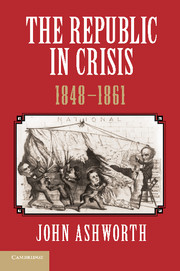Book contents
- Frontmatter
- Contents
- List of Maps and Cartoons
- Chronology of Events
- Introduction
- 1 The United States in 1848
- 2 Crisis at Mid-century, 1848–1851
- 3 Immigrants, Alcoholics and Their Enemies
- 4 Preparing for Disaster
- 5 Political Maelstrom, 1854–1856
- 6 North and South, Republican and Democrat
- 7 Political Polarisation, 1857–1860
- 8 Secession and the Outbreak of War, 1860–1861
- 9 Conclusion
- INDEX
- References
1 - The United States in 1848
A Nation Imperilled
Published online by Cambridge University Press: 05 September 2012
- Frontmatter
- Contents
- List of Maps and Cartoons
- Chronology of Events
- Introduction
- 1 The United States in 1848
- 2 Crisis at Mid-century, 1848–1851
- 3 Immigrants, Alcoholics and Their Enemies
- 4 Preparing for Disaster
- 5 Political Maelstrom, 1854–1856
- 6 North and South, Republican and Democrat
- 7 Political Polarisation, 1857–1860
- 8 Secession and the Outbreak of War, 1860–1861
- 9 Conclusion
- INDEX
- References
Summary
Eighteen forty eight was the year of revolutions in Europe. In the United States it seemed like business as usual, at least insofar as the stability of the nation was concerned. There was no revolution expected here. And none came. Nevertheless within little more than a dozen years, there would indeed be a revolution, a cataclysm which would set in train some devastating social, political and economic changes and, at the same time, claim the lives of far more men and women than had been casualties in Europe in its year of revolutions. Few Americans glimpsed this possibility in 1848.
Many instead, and understandably, congratulated themselves on not merely the stability but also the overall success of their nation. Contrary to the expectations of some European observers at the time and subsequently, the “experiment” that had been the American Republic in 1776 had been a triumphant success. This success had been political, economic and military.
Its political manifestation was obvious. The United States, as of March 1848 following the recent war and peace treaty with Mexico, comprised a huge nation covering not 890,000 square miles, as in 1776, but instead almost three million. There were now not thirteen but, by mid-1848, thirty states. Equally important the nation’s political institutions had advanced at what seemed an equally breathtaking pace. The Federal Constitution, drawn up and put into operation in the late 1780s, had survived not only unscathed but as an object of veneration to all but a small minority of Americans, or at least of white Americans. Presidents had come and gone, Congresses had been elected and then turned out as the Constitution stipulated, and a federal judiciary had operated sometimes controversially but never so as to bring large numbers of Americans to question the viability of their Republic. It was all much as the more optimistic of the nation’s founding fathers might have hoped.
- Type
- Chapter
- Information
- The Republic in Crisis, 1848–1861 , pp. 5 - 29Publisher: Cambridge University PressPrint publication year: 2012



